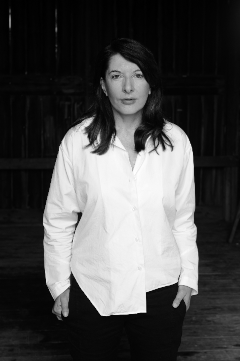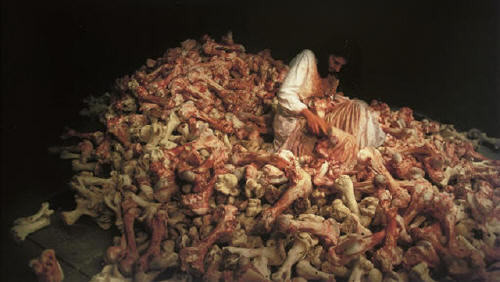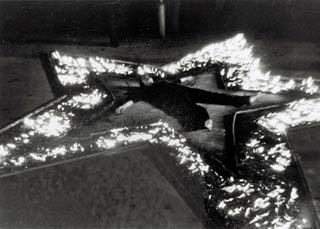|
|
| home | features | exhibitions | interviews | profiles | webprojects | gazetteer | links | archive | forum |
|
Marina Abramovic on
'The Pigs of Today are the Hams of Tomorrow'
As a member of the generation of pioneering performance artists that includes Bruce Nauman, Vito Acconci and Chris Burden, Marina Abramovic created some of the most historic of early performance pieces. Her work has been included in many large-scale international exhibitions including the Venice Biennale and Documenta VI, VII and IX. She was awarded the Golden Lion for Best Artist at the 1997 Venice Biennale for her video installation Balkan Baroque (picture below left). In September 2009 Abramovic was made an Honorary Doctor of the Arts by Plymouth University. She was interviewed by Paula Orrell prior to the 'The Pigs of Today are the Hams of Tomorrow' live symposium and performances.
MA 'It was really important that you were willing to organise this event here'...'It is really particular here, it's not a mainstream place but at the same time because of that, to me it is very interesting. There is an incredible enthusiasm for live performance, for living art. Many students are here that we have to address, and I have found that it is the right place to offer some guidance about this ancient and new form of art at the same time'... 'I think that this is the right place for me because I don’t believe in peripheries and centres, I believe in good ideas and wherever good ideas are happening is the centre. History is made where the good ideas are made'.
'What is the significance of the title, ‘The Pigs of Today are the Hams of Tomorrow’?' 'To me it is such an important title because it is a homage to George Jappe, the critic of conceptual art in the early seventies who I used to know. I remember when he used this title in Kunstforum (a German Magazine) referring to conceptual art - at that time it was even questioned it was art - and I felt this history is repeated so conceptual art became mainstream art and performance was always like nobody-territory'. 'The same thing has happened historically right now; performance is so much involved so much in focus right now everywhere in the world. The Pigs of Today are the Hams of Tomorrow has become a title that has so much irony and humour but also, it is something that deals with the true observation of that type of art'.
'To me there are similarities and differences. The first difference is the location and the situation, so the Manchester event happened in conjunction with the Manchester Festival, which was very well established already so it was just a part of that festival and also it was the first time one of the museums emptied their spaces in order to welcome performance art, which had never happened before. In Plymouth we have a completely different situation; it is not part of any festival, it is actually initiated by the individuals and institutions'... 'We are dealing with two alternative places, with one location in the military area and one in the Market on the main street in Plymouth. It is really a site-specific project at the same time and somehow doesn’t have context and doesn’t have history of performance art this is why it is so precious and so important. We are actually pioneering a project, which is not part of any larger festival, which I think is more adventurous and more pioneering than the Manchester Festival, which is already established, and part of something else'.
'This is the part I liked as they were selected in conjunction with Paula Orrell, so we actually looked into the proposals to select the artists and some of Paula’s suggestions were really important about the people who were really living here'. 'We have developed even more, this concept that is very important, to balance this performance event with the people who are part of the community already. We have addressed younger artists who have made site-specific proposals for the market place so that we can see in both ways: the performance artists who are performing already and have international recognition and very young artists who can have the chance to been seen in that context, which is very important'.
'What do you think about the venues for this project, and the context of Plymouth?' It is very important when you do art that there is a certain purpose and you're not just making art because of art itself. The context is very important and the architecture where the event is taking place, so here we have to deal with the history of the market place, the history of Plymouth and why this market is so important. The artists have to refer to the political social structures. Then there is another big issue, which is the presence of the military here in the city, so how do we deal with that? We have to make them somehow visible and not just spaces that we are using and are detached from the project and nothing to do with it. Those two locations and two contexts really have to reflect the work of the artists too'.
'What are your ambitions for the future for the Marina Abramovic Institute for the Preservation of Performance Art?' 'This is personally very important because this is the first time that publically I am presenting ideas about this project. First of all I need to have my legacy, I have believed in performance art all my life, it is what I have dedicated my life to so I really wanted this to develop. I didn’t want to run the place but I wanted to give some kind of guiding lights during my lifetime how this thing is going to develop. So I really think that Plymouth, for me, will be a part of my bibliographical significance because I wanted to collaborate and continue this relationship with Plymouth for the new Institute and to be part of this whole context'. 'For me, it is the place that not only gave me an honourable degree, which was great recognition for my work, its really giving me a hand with talking about the institution and helping with promoting it. It is a really important moment for this institute right now because it is going to be the first time ever it has been publically talked about'.
The Pigs of Today are the Hams of Tomorrow is from 21-24th January, 2010 |
|
|

 PO
'What is important about this project to you, in terms of its
location: Plymouth?'
PO
'What is important about this project to you, in terms of its
location: Plymouth?'
 'How
were the artists selected and works proposed?'
'How
were the artists selected and works proposed?'